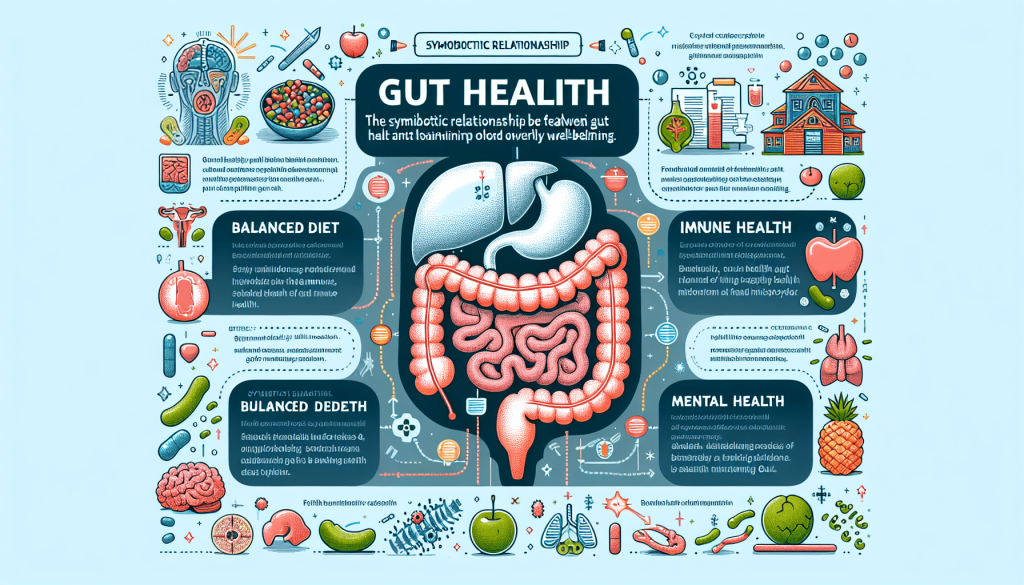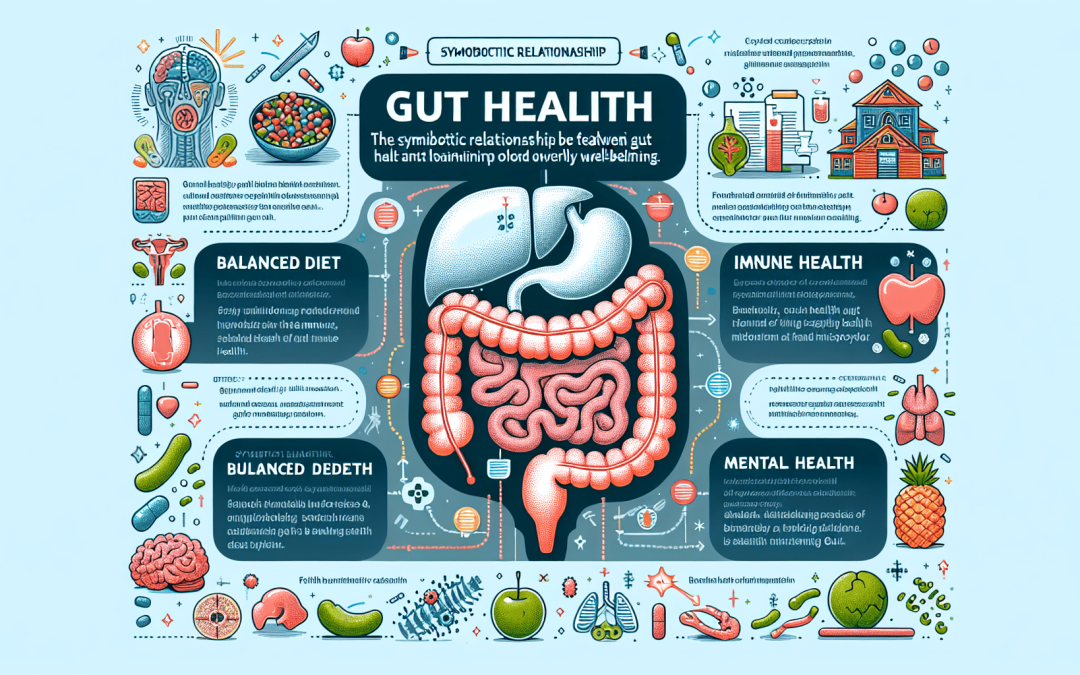Are you curious about how to maintain a healthy gut? Look no further! In this article, we will explore the importance of gut health and share some simple tips to help you keep your gut in tip-top shape. With our friendly tips, you’ll be on your way to a healthier gut in no time!
Understanding Gut Health
The Importance of Gut Health
Maintaining a healthy gut is crucial for overall well-being. Your gut, also known as the digestive tract, plays a vital role in many physiological processes, including digestion, nutrient absorption, and immune function. It is also home to trillions of bacteria, collectively known as gut microbiota, that have a significant impact on your health.
What is Gut Microbiota?
Gut microbiota refers to the diverse community of microorganisms, including bacteria, fungi, and viruses, residing in your digestive tract. These microorganisms are essential for maintaining a healthy gut. They help break down food, produce certain vitamins, regulate the immune system, and protect against harmful pathogens.
The Gut-Brain Connection
The gut and the brain are intimately connected, forming what is known as the gut-brain axis. This bidirectional communication pathway allows the gut and the brain to influence each other. For example, the gut microbiota can produce neurotransmitters that affect mood, while stress and emotions can impact gut motility and function. Understanding and nurturing this connection is crucial for maintaining optimal gut health.
Factors Affecting Gut Health
Diet and Nutrition
Your diet plays a major role in determining the health of your gut. Consuming a balanced diet that is rich in fiber, fruits, vegetables, whole grains, and lean proteins provides the necessary nutrients for gut health. On the other hand, a diet high in processed foods, sugars, unhealthy fats, and low in fiber can negatively impact the diversity and composition of gut microbiota.
Stress and Mental Health
Stress and mental health have a profound effect on gut health. Chronic stress can disrupt the balance of gut microbiota, leading to inflammation and digestive issues. Likewise, conditions such as anxiety and depression can alter gut motility and function. Managing stress through techniques like exercise, meditation, and seeking support is essential for maintaining a healthy gut.
Medications and Antibiotics
Certain medications and antibiotics can disrupt the delicate balance of gut microbiota. Antibiotics, while necessary to treat bacterial infections, can also kill beneficial bacteria in the gut, potentially leading to digestive problems. Additionally, medications like nonsteroidal anti-inflammatory drugs (NSAIDs) can damage the gut lining and impair the gut barrier function. It is important to carefully consider the use of these medications and, if necessary, seek professional guidance to minimize their impact on gut health.

Signs of an Unhealthy Gut
Digestive Issues
One of the tell-tale signs of an unhealthy gut is digestive issues. These may include symptoms such as bloating, gas, constipation, diarrhea, and abdominal discomfort. These symptoms often indicate an imbalance in gut microbiota or a disturbance in gut motility. If you experience persistent or severe digestive issues, it is important to seek medical advice for proper evaluation and treatment.
Food Intolerances
Food intolerances can be a sign of an unhealthy gut. When your gut is not functioning optimally, it may have difficulty breaking down certain types of foods, leading to intolerance or sensitivity. Common examples include lactose intolerance and gluten sensitivity. Identifying and avoiding trigger foods can alleviate symptoms and improve gut health.
Chronic Inflammation
Chronic inflammation in the gut can have detrimental effects on overall health. Inflammation may be caused by various factors, including imbalances in gut microbiota, poor diet, and chronic stress. Long-term inflammation has been linked to conditions such as inflammatory bowel disease (IBD) and can increase the risk of other systemic diseases. Monitoring for signs of chronic inflammation and addressing them promptly is essential for preserving gut health.
Ways to Maintain a Healthy Gut
Eat a Balanced Diet
A balanced diet is paramount for supporting a healthy gut. Aim to include a variety of nutrient-dense foods in your meals, such as fruits, vegetables, whole grains, lean proteins, and healthy fats. These foods provide essential vitamins, minerals, antioxidants, and fiber that nourish both your body and your gut microbiota.
Include Fiber-Rich Foods
Fiber is a crucial component of a healthy diet, particularly for maintaining gut health. Soluble fiber, found in foods like oats, legumes, and fruits, acts as a prebiotic, providing nourishment for beneficial gut bacteria. Insoluble fiber, present in vegetables, whole grains, and nuts, helps promote regular bowel movements and maintain gut integrity. Including a variety of fiber-rich foods in your diet can improve gut health and prevent constipation.
Stay Hydrated
Adequate hydration is essential for maintaining a healthy gut and overall well-being. Water helps lubricate the digestive system, allowing for smooth passage of food and waste. It also supports the proper balance of electrolytes, which aid in normal gut function. Aim to drink at least 8 cups of water per day and adjust your intake based on your activity level and environmental factors.

Probiotics and Prebiotics
Understanding Probiotics
Probiotics are beneficial live organisms that can confer health benefits when consumed in adequate amounts. They help restore and maintain a diverse and balanced gut microbiota. Probiotics can be found in certain fermented foods, such as yogurt, sauerkraut, and kefir, as well as in supplement form.
Sources of Probiotics
Incorporating probiotic-rich foods into your diet can support a healthy gut. Yogurt, especially those labeled with live and active cultures, is a well-known source of probiotics. Other fermented foods like kimchi, tempeh, and kombucha also contain beneficial bacteria. Additionally, probiotic supplements are available for those who may need higher doses or have specific health concerns.
Benefits of Prebiotics
Prebiotics are a type of fiber that acts as a food source for probiotics and stimulates their growth. By including prebiotic-rich foods in your diet, you can help promote the growth and function of beneficial gut bacteria. Foods such as onions, garlic, bananas, asparagus, and oats are excellent sources of prebiotics and can contribute to a healthy gut.
The Role of Exercise
Impact on Gut Health
Regular physical activity has a positive impact on gut health. Exercise increases gut motility, helping to prevent constipation and promote regular bowel movements. It also enhances blood flow to the gut, improving nutrient absorption and overall gut function. Engaging in a consistent exercise routine can contribute to a healthier gut and overall well-being.
Recommended Exercise Types
A combination of aerobic exercise and strength training is recommended for optimal gut health. Aerobic exercises, such as walking, running, swimming, or cycling, can help improve gut motility and reduce digestive issues. Strength training exercises, including weightlifting or bodyweight exercises, stimulate muscle growth and enhance metabolism. Aim for at least 150 minutes of moderate-intensity aerobic activity or 75 minutes of vigorous-intensity aerobic activity per week, along with strength training exercises at least twice a week.
Duration and Frequency
The duration and frequency of exercise can vary depending on individual preferences and abilities. It is important to find a routine that works for you and is sustainable in the long term. Start with realistic goals and gradually increase the intensity and duration of your workouts. Consistency is key, so aim for regular exercise sessions throughout the week rather than sporadic intense workouts.

Reducing Stress for Gut Health
Stress Management Techniques
Effectively managing stress is crucial for maintaining a healthy gut. There are various stress management techniques that can help, such as deep breathing exercises, yoga, tai chi, and progressive muscle relaxation. Find activities that help you unwind and incorporate them into your daily routine to reduce stress levels and support optimal gut health.
Meditation and Mindfulness
Practicing meditation and mindfulness can have a profound impact on gut health. These techniques involve focusing your attention on the present moment, promoting relaxation and reducing stress. Regular meditation and mindfulness practice can help regulate gut motility, improve digestion, and enhance overall gut health.
Quality Sleep
Getting adequate and quality sleep is essential for gut health. Lack of sleep can disrupt the balance of gut microbiota, increase inflammation, and impair digestion. Establishing a consistent sleep routine and creating a sleep-friendly environment can help optimize both the quantity and quality of your sleep, supporting a healthy gut.
Avoiding Harmful Substances
Limiting Alcohol Intake
Excessive alcohol consumption can adversely affect gut health. Alcohol can disrupt the balance of gut microbiota, damage the gut lining, and lead to inflammation. To maintain a healthy gut, it is important to limit alcohol intake and practice moderation. If you choose to drink, do so in moderation and consider opting for healthier alternatives like low-alcohol or non-alcoholic beverages.
Quitting Smoking
Smoking is detrimental to overall health, including gut health. It can increase the risk of gastrointestinal disorders, impair the gut barrier function, and disrupt gut microbiota. Quitting smoking is one of the most beneficial actions you can take to improve your gut health. Seek support from healthcare professionals or smoking cessation programs to help you quit successfully.
Reducing Caffeine Consumption
While moderate caffeine intake is generally safe for most individuals, excessive consumption can have negative effects on gut health. Caffeine can stimulate the production of stomach acid and affect gut motility, potentially leading to acid reflux and digestive issues. Limiting caffeine intake, especially in the evening, can help maintain a healthy gut and promote better sleep.

Getting Adequate Sleep
Importance of Sleep for Gut Health
Sufficient, quality sleep plays a crucial role in maintaining a healthy gut. During sleep, the body performs repair and regeneration processes, including gut tissue healing and gut microbiota restoration. Lack of sleep can disrupt these processes, leading to imbalances in gut microbiota and impaired gut function. Prioritizing sleep and ensuring you get enough hours of restful sleep each night is essential for optimal gut health.
Establishing a Sleep Routine
Establishing a consistent sleep routine can help regulate your body’s internal clock and promote better sleep. Try to go to bed and wake up at the same time every day, even on weekends. Create a relaxing bedtime routine that includes activities such as reading, taking a warm bath, or practicing relaxation techniques. By following a sleep routine, you can improve sleep quality and support a healthy gut.
Creating a Sleep-Friendly Environment
Creating a sleep-friendly environment can significantly contribute to better sleep and gut health. Ensure your bedroom is dark, quiet, and cool, as these conditions promote optimal sleep. Use blackout curtains or eye masks to block out light, earplugs or white noise machines to minimize noise, and a comfortably cool room temperature. Investing in a supportive mattress and pillows can also enhance sleep quality and overall well-being.
When to Seek Medical Advice
Persistent Gut Issues
If you experience persistent gut issues, such as chronic abdominal pain, severe bloating, unexplained weight loss, or persistent changes in bowel habits, it is important to seek medical advice. These symptoms could indicate underlying gut conditions that require proper evaluation and treatment by a healthcare professional.
Unexplained Symptoms
Unexplained symptoms that affect multiple body systems, such as joint pain, skin rashes, fatigue, or brain fog, may be an indication of gut-related disorders. Consulting a healthcare professional can help identify potential connections between these symptoms and gut health. They can provide appropriate guidance, perform diagnostic tests, and develop a personalized treatment plan.
Consulting a Healthcare Professional
If you have concerns about your gut health or need guidance on maintaining a healthy gut, it is advisable to consult a healthcare professional. They can assess your individual circumstances, provide personalized recommendations, and address any specific concerns or symptoms you may have. Building a collaborative relationship with a healthcare professional is essential for optimizing your gut health and overall well-being.
In conclusion, understanding and maintaining a healthy gut is essential for overall health and well-being. By adopting healthy lifestyle habits, such as following a balanced diet, managing stress, and getting adequate sleep, you can support optimal gut health. Additionally, incorporating probiotics, prebiotics, and regular exercise into your routine can further enhance gut microbiota and promote digestive wellness. If you have persistent gut issues or unexplained symptoms, consulting a healthcare professional is recommended to ensure proper evaluation and treatment. Remember, a healthy gut translates into a healthier, happier you!









